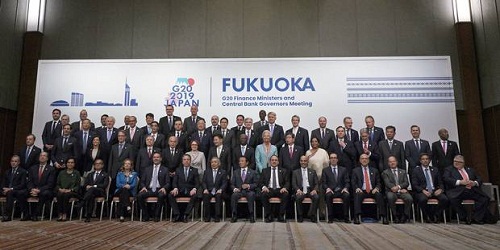As a part of setting the stage for 2019 G20 Summit, to be held in Osaka, Japan, from 28-29 June 2019, a G20 Finance Ministers and Central Bank Governors Meet was held in Fukuoka, Japan on 8-9 June. It was one of the 8 ministerial meetings taking place in Japan before 2019 G20 summit. This is for the first time that Japan is hosting the G20 Summit & Ministerial Meetings at its eight different locations.
 Objective of G20 Finance Ministers meeting and Central Bank Governors meet:
Objective of G20 Finance Ministers meeting and Central Bank Governors meet:
- Started in 1999, its objective is to discuss major international economic issues and to coordinate to achieve the stable and sustainable growth of the global economy.
- For 2019, the leaders have set up “Priorities for G20 Finance Track in 2019” consisting of Global Economy – Risks and Challenges, Actions toward Robust Growth and Response to Structural Changes caused by Innovation and Globalization.
About Indian Delegation:
The Indian side was led by Union Minister for Finance & Corporate Affairs Nirmala Sitharaman which was comprised of Subhash C. Garg, Finance Secretary & Secretary Economic Affairs, Dr. Viral Acharya, Deputy Governor of RBI and other officers. This was her first overseas visit as the Finance Minister. She has raised the following points:
- Issues relate to taxation and digital economy companies, and to curb tax avoidance & evasion.
- To contain an international oil market to bring benefits to both the oil exporting and importing countries.
- Issue of economic offenders fleeing legal jurisdictions and calls for cohesive action against such offenders.
Key Highlights
Focus towards global growth
The focus was on increasing protectionism and its implication on global growth and trade, as the International Monetary Fund (IMF) has cut its forecast for global growth from 3.6% to 3.3% in 2019.
Implementation of fair tax reforms to boost growth:
- The discussions were held regarding the fair tax reforms so that big companies pay their fair share and support economies as global growth slows.
- Currently, countries are trying to lure companies by offering unsustainably and unfairly low tax rates as an incentive.
- So, the G20 ministers want that digital giants such as Amazon, Google, and Facebook to be taxed where they are headquartered, and instead implement taxes based on their revenue and number of users in every market where they operate.
Call for the creation of “digital tax”
i. The ministers have called for the creation of a digital tax for multinational technology companies in order to prevent tax evasion and to modernise policies. Its details will be finalized in 2020.
ii. Countries have agreed to set up a new tax model that is adapted to the digital economy.
iii. This initiative has two fundamental pillars:
- One based on ending with the principle of taxation according to the physical presence of the country.
- Another aimed at stopping the tax competition and companies turning to countries with less tax pressure.
About G20:
The G20 is made up of 19 countries and the EU. The 19 countries are Argentina, Australia, Brazil, Canada, China, Germany, France, India, Indonesia, Italy, Japan, Mexico, the Russian Federation, Saudi Arabia, South Africa, South Korea, Turkey, the UK and the US.
About Japan
♦ Prime Minister – Shinzo Abe
♦ Capital – Tokyo
♦ Currency – Japanese yen




